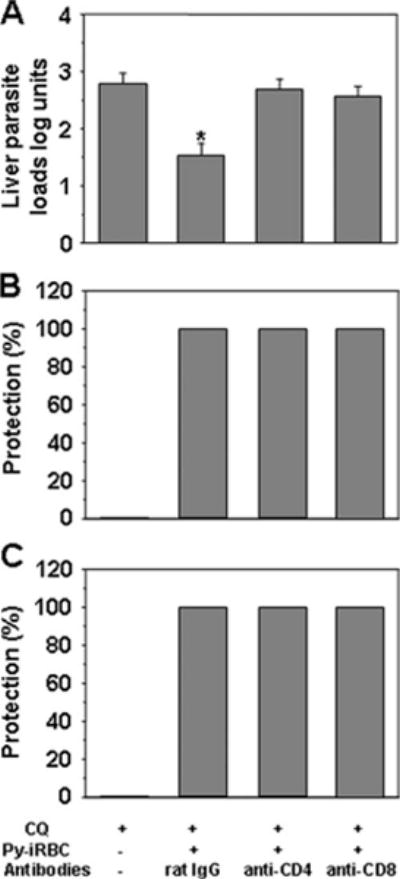FIGURE 3.

Immunization with iRBC under chloroquine cover induce a protective T cell response against liver but not blood stage parasites. A, Groups of BALB/c mice were immunized with 106 iRBC under chloroquine cover, then i.v. challenged with 35,000 sporozoites 15 days after the last immunizing dose so that the extent of hepatic parasite development could be assessed (29). On day 1 day 0 before the challenge, immunized mice were injected with control rat IgG, rat anti-CD8, or rat anti-CD4. Results were expressed as mean liver parasite load log units ± SEM of n = 5 mice. *, p < 0.05 vs control mice using ANOVA followed by Tukey’s test corresponding to a reduction in parasite load of >95% when the arithmetic values were used for calculation. B, Groups of BALB/c mice were immunized with 106 Py-iRBC under chloroquine cover as in A. Control groups received chloroquine alone. Immunized mice were injected with the control IgG, anti-CD8 or anti-CD4 Abs as described. Mice were challenged with 4000 live sporozoites infection was determined on Giemsa-stained blood smears over a 10-day period. All control mice treated with chloroquine mice (n = 10) developed patent blood stage parasitemia after sporozoite challenge. This experiment was performed twice. C, Groups of BALB/c mice were immunized with 106 iRBC under chloroquine cover as in A. Control groups received chloroquine alone. Immunized mice were injected with the control IgG, anti-CD8 or anti-CD4 Abs as described. Mce were challenged with 105 P. yoelii 265BY iRBC. These mice were completely protected against a challenge with blood stage parasites.
